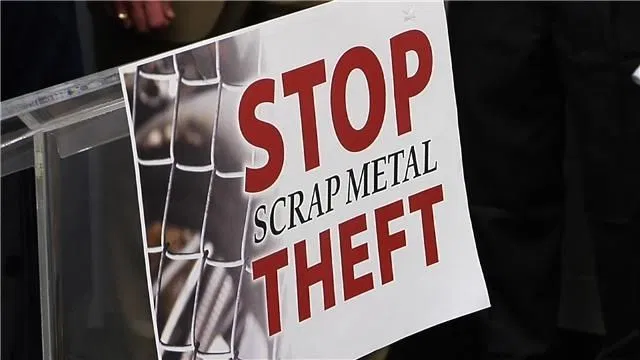In recent years, the scrap metal recycling industry has seen a notable surge in scrap metal theft. This type of theft not only disrupts business operations but can also lead to substantial financial losses. Industrial businesses are particularly vulnerable, given the high value of metals such as copper, aluminum, and brass often left in accessible areas. Understanding scrap metal theft, its impacts, and the measures to combat scrap metal theft is crucial for maintaining the security of your assets and the profitability of your business.

The Problem at Hand
Scrap Metal theft is a global concern, driven by the rising prices of scrap metals on the international market. The US Department of Energy reports a staggering $1 billion annual loss due to copper theft alone. Thieves target metals due to their value and relative ease of access in outdoor commercial containers, demolition sites, or construction areas. The allure of quick cash has fueled this surge of incidents at industrial sites, where metals are often stored in bulk before recycling or further use.
Commonly Targeted Metals
-
- Copper: Highly sought after due to its use in electrical wiring and plumbing.
-
- Aluminum: Used in construction, transportation, and packaging.
-
- Brass: Found in fixtures and fittings.
-
- Lead: Often stolen from roofs, pipes, and batteries.
The Impact of Metal Theft
The theft of these metals can have severe repercussions, including:
-
- Operational Disruptions: Theft can halt production lines and delay projects.
-
- Financial Losses: The cost of replacing stolen metals and repairing any damage can be substantial.
-
- Safety Hazards: Thieves often cause damage to infrastructure, creating potential safety risks.
Steps to Combat Scrap Metal Theft
1. Risk Assessment:
Begin with a comprehensive risk assessment of your site. Identify vulnerable areas where metals are stored and evaluate the current security measures in place. The goal is to make your premises less attractive or accessible to potential thieves.
2. Enhance Physical Security:
-
- Secure Storage Areas: Use locked fences, gates, and consider investing in secure storage solutions for high-value metals.
-
- Lighting: Ensure all storage areas are well-lit to deter thieves.
-
- Surveillance Systems: Install CCTV cameras around storage areas and entry points. Modern systems with motion detection can alert you to unauthorized access.
-
- Alarm Systems: Consider alarms that notify local authorities or security personnel of a breach.
3. Control Access:
-
- Limited Access: Restrict access to areas where metals are stored. Only authorized personnel should have access.
-
- Key Control: Implement a system to track who has keys or access codes, ensuring they are returned or changed if an employee leaves.
4. Employee Training and Awareness:
Educate employees on the importance of security measures and how to recognize suspicious activities. Encourage them to report any unusual behavior and set up reporting channels to encourage quick and easy communication between employees and managers.
5. Marking and Tracking:
-
- Property Marking: Use marking tools to place or etch identifying information on metal assets, making them less attractive to thieves and easier to recover. Use technologies like UV marking pens or microdot technology on your metals which makes them easily identifiable if stolen and recovered by police authorities.
-
- Technology: Invest in GPS tracking for high-value items, allowing you to monitor their location in real-time.
6. Collaboration and Reporting:
-
- Engage with Local Law Enforcement: Work closely with local authorities to report thefts and receive advice on preventing future incidents.
-
- Industry Collaboration: Share information with other businesses and recycling centers to be aware of theft trends and methods.
-
- Rapid Response: If an incident occurs, have a plan ready for a quick response involving local law enforcement agencies immediately after discovering the crime has taken place.
-
- Maintain Detailed Reports: Perform regular inventory checks and track all transactions related to the selling/buying of scrap metals to help identify any irregularities. At Metro Group, we provide detailed records of metal sales, pickups, and client information to assist in the documentation.
7. Insurance:
Review your insurance policies to ensure they cover theft of metals. This can provide financial protection against significant losses.
8. Incident Response Plan:
Develop a clear plan outlining the steps to take in the event of a theft, including immediate actions to secure the site and the process for reporting the theft to authorities.
In Conclusion
Most thieves are looking for simple, accessible, and easy targets. While it’s impossible to eliminate all risks, by implementing some or all of the above steps, you will discourage most thieves from attempting to steal from your location. Even taking small actions, like adding lights or putting up “under surveillance” signs can remove the temptation and will go a long way toward protecting your business assets and ensuring continued operations. Remember, the key to combating metal theft lies in preparation, prevention, and rapid response.
At Metro Group, we are dedicated to moving your business forward and making your day-to-day operations smoother. Our commitment goes beyond just providing recycling services; we strive to be a partner in your journey, working alongside you to ensure your enterprise thrives both financially and operationally. Please reach out if you have any ideas or questions regarding scrap metal theft.

